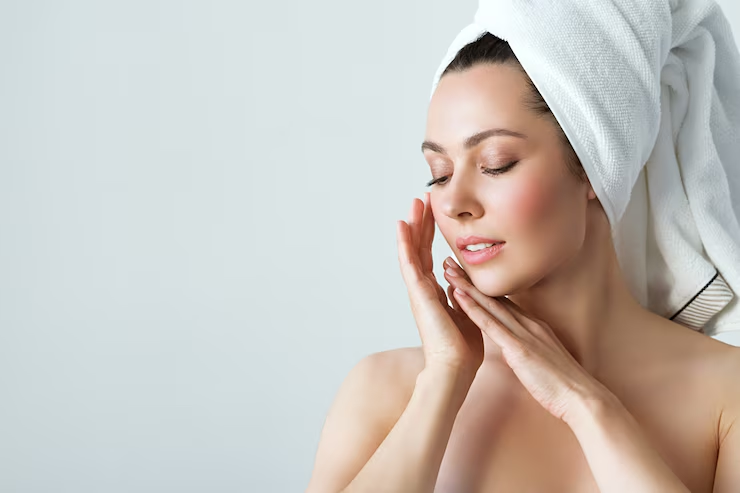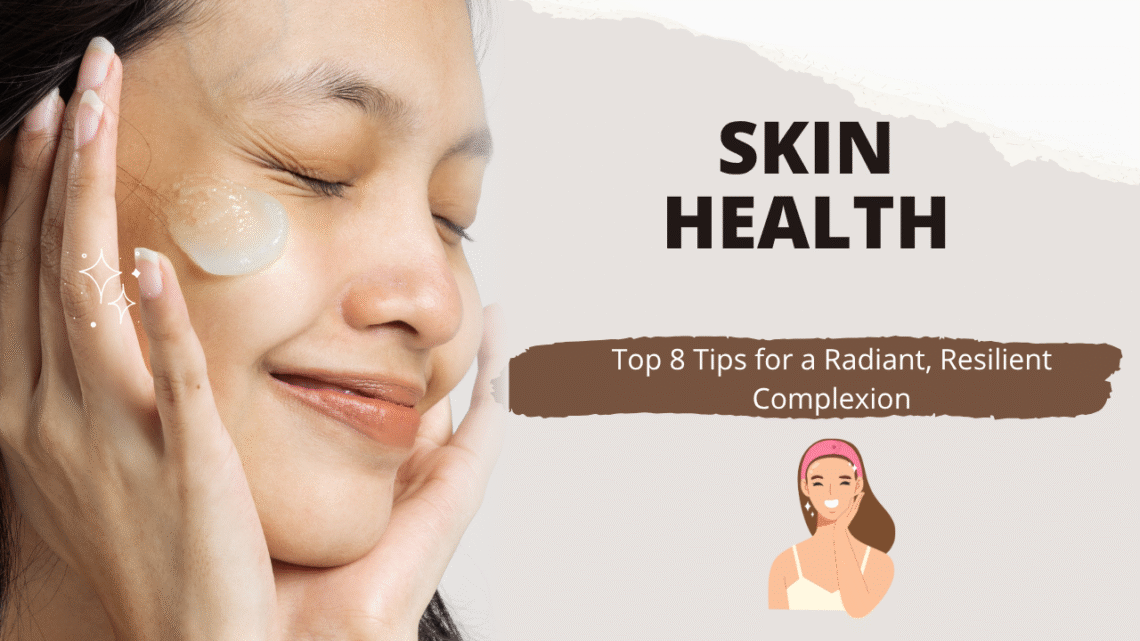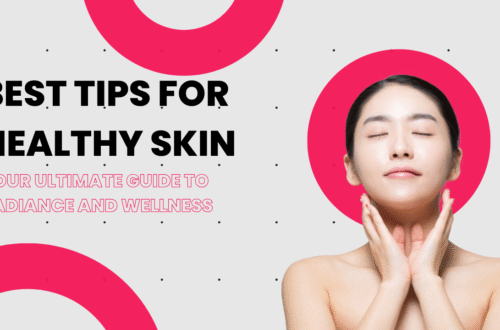Introduction
Your skin is your body’s largest organ—and a reflection of your overall health. From protecting against environmental damage to regulating temperature and retaining moisture, healthy skin plays a vital role in your well-being. But achieving and maintaining radiant skin requires more than just a good face cream. It involves a combination of smart skincare, lifestyle habits, and attention to internal health.
In this detailed 2500-word article, we’ll explore the science behind skin health, provide expert-backed guidance, and reveal the top 8 tips to nourish your skin inside and out. Whether you’re battling acne, dryness, dullness, or simply looking to glow, this guide offers everything you need to know.
Understanding Skin Health: What It Really Means
Skin health is a reflection of how well your skin performs its natural functions—such as protection, temperature regulation, and moisture retention—without signs of damage, inflammation, or disease. Maintaining skin that functions properly is key to both appearance and overall wellness.

Healthy skin is typically smooth, well-hydrated, resilient, and evenly toned. It protects the body from external irritants, defends against harmful microbes, and supports internal balance. When your skin is healthy, it feels comfortable, looks vibrant, and recovers quickly from minor wounds or stress.
Key components of skin health include a strong skin barrier, optimal hydration, balanced oil production, and regular cell turnover. Factors like nutrition, sleep, sun protection, and stress management all influence these processes. By understanding what your skin needs and responding with consistent care, you can preserve and enhance your skin health for the long term.
- Skin barrier function
- Hydration levels
- Elasticity and firmness
- Cell regeneration
- Protection from UV and pollutants
Many internal and external factors impact skin health, including genetics, diet, stress, environment, and skincare habits.
Top 8 Tips for Healthy, Glowing Skin
1. Cleanse Gently and Regularly
Cleansing is a fundamental step for maintaining good skin health. It helps remove daily buildup of dirt, oil, sweat, makeup, and environmental pollutants that can clog pores and trigger breakouts. A clean surface allows your skincare products to work more effectively, supporting a healthy complexion.
For optimal skin health, choose a gentle, pH-balanced cleanser suited to your skin type—whether oily, dry, sensitive, or combination. Harsh soaps or excessive washing can strip your skin’s natural oils, damaging the protective barrier and causing dryness or irritation. The goal is to cleanse without disrupting the skin’s natural balance.
Cleanse your face twice daily—once in the morning and once before bed. Always use lukewarm water, as hot water can dry out and weaken your skin. Gentle cleansing, done consistently, is essential for supporting long-term skin health and keeping your skin fresh, comfortable, and resilient.
2. Hydrate from Inside and Out
Cleansing is a fundamental step for maintaining good skin health. It helps remove daily buildup of dirt, oil, sweat, makeup, and environmental pollutants that can clog pores and trigger breakouts. A clean surface allows your skincare products to work more effectively, supporting a healthy complexion.
For optimal skin health, choose a gentle, pH-balanced cleanser suited to your skin type—whether oily, dry, sensitive, or combination. Harsh soaps or excessive washing can strip your skin’s natural oils, damaging the protective barrier and causing dryness or irritation. The goal is to cleanse without disrupting the skin’s natural balance.
Cleanse your face twice daily—once in the morning and once before bed. Always use lukewarm water, as hot water can dry out and weaken your skin. Gentle cleansing, done consistently, is essential for supporting long-term skin health and keeping your skin fresh, comfortable, and resilient.
3. Use Sunscreen Every Single Day
Sun exposure is one of the most damaging factors affecting skin health. Harmful UV rays can penetrate deep into the skin, breaking down collagen and elastin—leading to wrinkles, sagging, and age spots. Prolonged exposure also increases the risk of skin cancer, making sun protection a daily necessity.

To safeguard your skin health, apply a broad-spectrum sunscreen with at least SPF 30 every day. This includes cloudy days or when indoors near windows, as UVA rays can pass through glass and contribute to skin aging. Sunscreens with added antioxidants offer an extra layer of protection against environmental stressors.
When outdoors, remember to reapply sunscreen every two hours, especially after swimming or sweating. Making sun protection a non-negotiable part of your skincare routine helps preserve your skin’s structure, even tone, and overall resilience—key elements for long-term skin health and a youthful complexion.
4. Feed Your Skin with the Right Nutrients
A healthy, nutrient-rich diet plays a crucial role in promoting glowing, resilient skin health. What you eat directly affects how your skin looks, feels, and functions. Nutrients from food support collagen production, reduce inflammation, and protect your skin from environmental damage.
For optimal skin health, include foods rich in vitamin C (citrus fruits, bell peppers), which helps brighten skin and boost collagen. Add vitamin E (nuts, seeds, spinach) for antioxidant protection, and omega-3 fatty acids (fatty fish, flaxseeds) to reduce dryness and inflammation. Zinc from legumes and whole grains aids in healing and supports clear skin.
A diet full of colorful fruits, vegetables, lean proteins, and healthy fats fuels your body from the inside out. Avoid excess sugar and processed foods, which can trigger breakouts and dullness. Making intentional food choices supports overall wellness and is one of the most effective, natural ways to enhance skin health long-term.
- Vitamin C (brightens and supports collagen)
- Vitamin E (protects from oxidative stress)
- Omega-3 fatty acids (reduce inflammation)
- Zinc (fights acne and promotes healing)
- Antioxidants (protect against aging)
Colorful vegetables, leafy greens, fatty fish, nuts, seeds, and fruits like berries and citrus can all enhance skin health from the inside out.
5. Prioritize Sleep and Recovery

Getting enough sleep is one of the most powerful ways to support your overall skin health. During deep sleep, your body enters repair mode, producing collagen, healing minor damage, and regenerating skin cells. This nightly process helps maintain firmness, smoothness, and a healthy complexion.
When you don’t get enough rest, the effects quickly show on your skin. Poor sleep can lead to dullness, dark under-eye circles, and increased breakouts. It also disrupts hormone balance, raising cortisol levels and inflammation, both of which negatively impact skin health over time.
To promote radiant, resilient skin, aim for 7 to 9 hours of quality sleep each night. Maintain a relaxing bedtime routine, limit screen time before bed, and create a comfortable sleep environment. Prioritizing rest allows your skin to restore itself naturally and plays a critical role in maintaining long-term skin health and youthful glow.
Create a calming bedtime routine, reduce blue light exposure before bed, and consider using a silk pillowcase to minimize skin friction. Quality sleep is one of the most underrated tips for glowing skin health.
6. Manage Stress Effectively
Getting enough sleep is one of the most powerful ways to support your overall skin health. During deep sleep, your body enters repair mode, producing collagen, healing minor damage, and regenerating skin cells. This nightly process helps maintain firmness, smoothness, and a healthy complexion.
When you don’t get enough rest, the effects quickly show on your skin. Poor sleep can lead to dullness, dark under-eye circles, and increased breakouts. It also disrupts hormone balance, raising cortisol levels and inflammation, both of which negatively impact skin health over time.
To promote radiant, resilient skin, aim for 7 to 9 hours of quality sleep each night. Maintain a relaxing bedtime routine, limit screen time before bed, and create a comfortable sleep environment. Prioritizing rest allows your skin to restore itself naturally and plays a critical role in maintaining long-term skin health and youthful glow.
7. Be Smart with Active Ingredients
Active skincare ingredients such as retinol, niacinamide, AHAs/BHAs, and vitamin C are powerful tools to improve your skin’s texture, brightness, and clarity. These actives can visibly transform your complexion, but using them properly is essential for protecting and enhancing your overall skin health.
To avoid irritation and maintain balance, always introduce one active ingredient at a time. This allows your skin to adapt gradually and reduces the risk of sensitivity or over-exfoliation. A patch test is crucial before full application to ensure compatibility and avoid reactions that could disrupt your skin health.
For safe and effective use, apply SPF daily, especially when using ingredients like retinol or acids that increase sun sensitivity. Pair strong actives with calming ingredients like aloe vera, ceramides, or peptides to protect your skin barrier. Understanding how to layer and combine actives correctly is vital for achieving radiant, healthy skin and maintaining long-term skin health.
8. Don’t Neglect Consistency and Simplicity
You don’t need a complicated 10-step skincare routine to achieve great skin health. What truly matters is consistency with a few key steps: cleansing, moisturizing, and protecting with sunscreen. Targeted treatments like serums or actives can be added based on your specific skin concerns—but only when needed.
Using too many products or switching routines frequently can irritate your skin and weaken your barrier, ultimately harming your skin health. A simple, focused approach not only saves time and money but also helps your skin respond better to treatment over time.
Remember, visible changes won’t happen overnight. It takes about 4–6 weeks for your skin to renew itself, so patience is essential. Consistent, sustainable habits—rather than trendy quick fixes—are the foundation of long-lasting skin health. Stick to a routine that works for your skin type, and you’ll see real, lasting improvements in texture, tone, and overall radiance.
Bonus Tips for Skin Health
- Avoid smoking and limit alcohol
- Change pillowcases regularly
- Keep hands off your face
- Use lukewarm water for washing
- Exercise regularly to boost circulation
These simple lifestyle changes can dramatically boost your skin’s resilience and radiance.
Common Skin Myths Debunked

Myth 1: Oily skin doesn’t need moisturizer – False. Hydration helps balance oil production.
Myth 2: You only need sunscreen when it’s sunny – False. UV rays penetrate clouds and windows.
Myth 3: Natural ingredients are always safe – False. Many natural ingredients can still irritate sensitive skin.
Myth 4: Drinking more water instantly clears your skin – Partly true. Hydration helps, but it’s not a cure-all.
When to See a Dermatologist
If you’re dealing with chronic acne, eczema, rosacea, or pigmentation that won’t improve with routine care, it’s time to see a professional. A board-certified dermatologist can customize treatments and help you protect your skin health long term.
Conclusion: Healthy Skin is an Ongoing Journey
Glowing, resilient skin isn’t achieved overnight. It’s built day by day through mindful habits, nourishing choices, and consistent care. Whether you’re dealing with common issues or simply want to maintain your current glow, these 8 expert tips provide a solid foundation for optimal skin health.
Invest in your skin—it protects you every single day.
Final Thoughts: Skin Health
Caring for your skin isn’t just about vanity—it’s an essential part of your overall health and well-being. Your skin is your body’s largest organ, acting as a barrier against the environment, regulating temperature, and reflecting your internal health. Maintaining optimal skin health ensures that this barrier stays strong, balanced, and resilient for years to come.
Healthy skin doesn’t happen overnight. It requires a combination of consistent habits, smart skincare choices, and a balanced lifestyle. From wearing sunscreen daily to eating nutrient-rich foods, sleeping well, managing stress, and choosing products that support your unique skin type—every small action contributes to the bigger picture. It’s not about perfection or the latest beauty trend; it’s about what works for you and your skin’s long-term needs.
One of the most important lessons in skin health is that less is often more. You don’t need a shelf full of products to achieve results. Instead, focus on a simple, effective routine: cleanse, hydrate, protect, and nourish. Avoid overloading your skin with actives, and always introduce new ingredients slowly. Be gentle, be consistent, and give your skin time to respond.
Remember, your skin is constantly renewing itself. It takes about 28 days for a full cell turnover, so be patient. If you don’t see instant results, that doesn’t mean your routine isn’t working. Stick with it. Over time, your skin will reflect the care you’ve invested in it.
Lastly, always listen to your skin. If something causes irritation, redness, or discomfort, it’s your body’s way of telling you to reevaluate. And if you’re dealing with persistent skin issues—like acne, eczema, or discoloration—don’t hesitate to consult a dermatologist. Professional support is a valuable part of your skin wellness journey.
In the end, skin health is a lifelong commitment. The earlier you start taking care of your skin, the better it will serve you as you age. Treat it with respect, nourish it inside and out, and it will reward you with strength, glow, and confidence. Healthy skin isn’t just about how you look—it’s about how you live.
FAQ
1. What is the most important step in a skincare routine for healthy skin?
The most crucial step is daily sun protection. Using a broad-spectrum SPF of at least 30 every day protects your skin from premature aging, pigmentation, and skin cancer. Without sun protection, other skincare efforts can be undone by UV damage.
2. How can I tell what my skin type is?
Cleanse your face and wait 30 minutes without applying any products.
- If your skin feels tight or flaky, it’s dry.
- If it’s shiny all over, it’s oily.
- If only your T-zone is oily, you have combination skin.
- If it feels comfortable and balanced, you’re normal.
- If it gets red or stings easily, it’s sensitive.
3. How often should I exfoliate?
1–2 times per week is ideal for most skin types. Over-exfoliating can damage the skin barrier, causing redness, dryness, or breakouts. Use gentle chemical exfoliants like AHAs or BHAs instead of harsh scrubs.
4. What foods are best for skin health?
Eat a variety of antioxidant-rich and anti-inflammatory foods:
- Berries, leafy greens, and citrus (Vitamin C)
- Fatty fish, flaxseeds (Omega-3s)
- Nuts and seeds (Vitamin E and zinc)
- Water – hydration is essential for glowing skin
5. Can stress really affect my skin?
Yes. Chronic stress increases cortisol, which can trigger acne, inflammation, and dryness. It also slows down skin healing and can worsen conditions like eczema or rosacea. Managing stress is essential for long-term skin health.
6. How do I know if my skin is healthy?
Healthy skin is typically smooth, evenly toned, and well-hydrated. It feels comfortable—not tight or overly oily—and it recovers quickly from breakouts or minor irritation. Minimal redness, balanced oil production, and a natural glow are good signs of strong skin health.
7. Can I improve my skin health just by changing my diet?
Yes, diet plays a big role in skin health, but it’s only one part of the puzzle. Eating foods rich in antioxidants, omega-3 fatty acids, vitamins C and E, and staying hydrated can enhance your skin from the inside. However, pairing a healthy diet with a proper skincare routine and good lifestyle habits delivers the best results.
8. How often should I change my skincare routine?
You don’t need to change your routine frequently. Stick to a consistent regimen for at least 4–6 weeks to allow your skin to adjust. Only change products if your skin’s needs shift due to age, weather, or specific concerns. A stable, personalized routine is key to lasting skin health.





